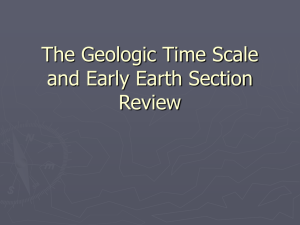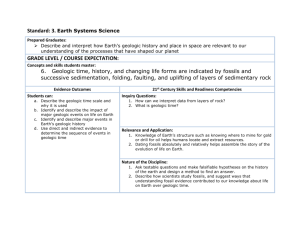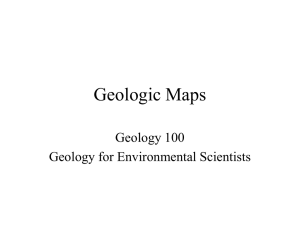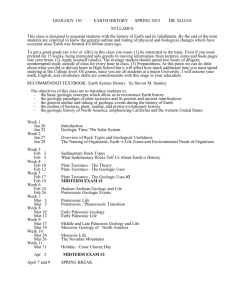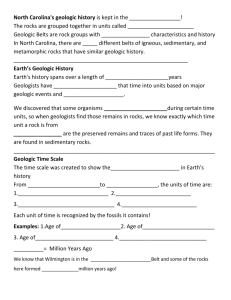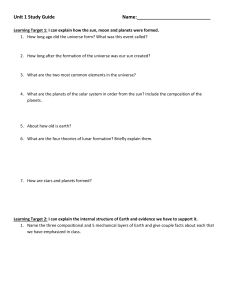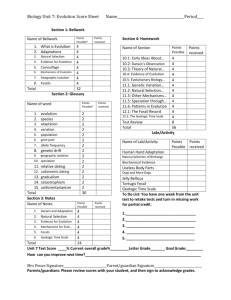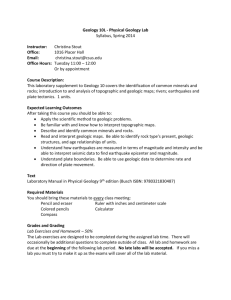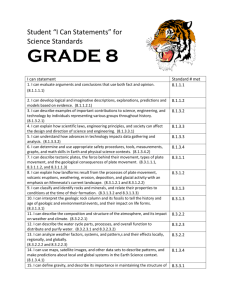GCCR_EES_235_syllabus
advertisement
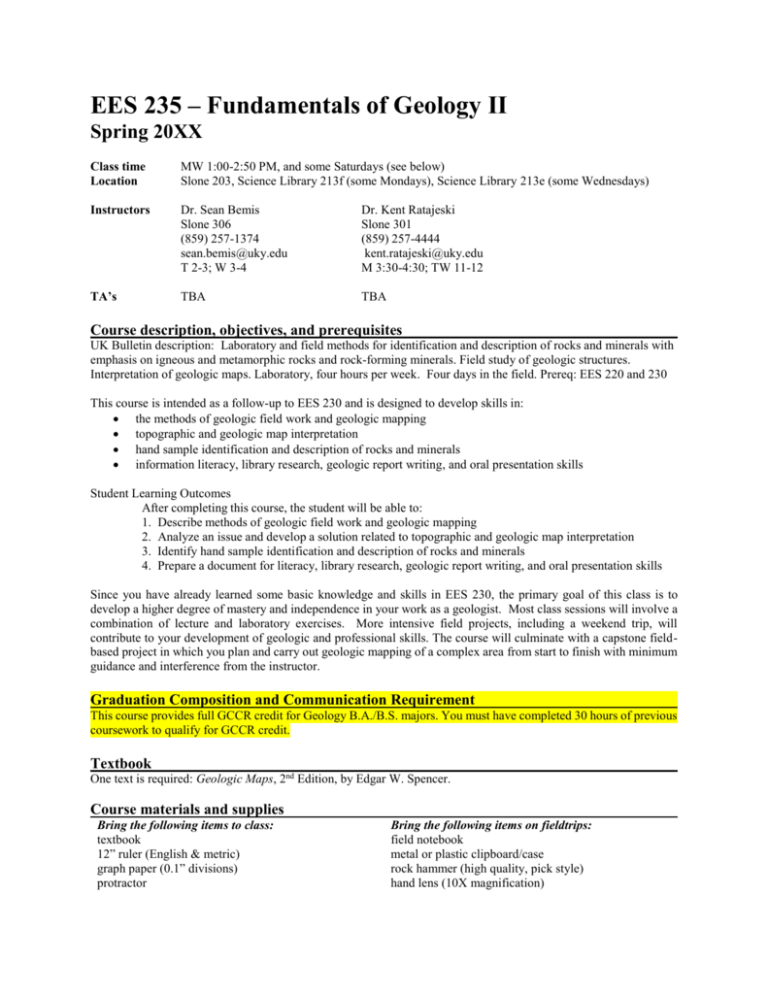
EES 235 – Fundamentals of Geology II Spring 20XX Class time Location MW 1:00-2:50 PM, and some Saturdays (see below) Slone 203, Science Library 213f (some Mondays), Science Library 213e (some Wednesdays) Instructors Dr. Sean Bemis Slone 306 (859) 257-1374 sean.bemis@uky.edu T 2-3; W 3-4 Dr. Kent Ratajeski Slone 301 (859) 257-4444 kent.ratajeski@uky.edu M 3:30-4:30; TW 11-12 TA’s TBA TBA Course description, objectives, and prerequisites UK Bulletin description: Laboratory and field methods for identification and description of rocks and minerals with emphasis on igneous and metamorphic rocks and rock-forming minerals. Field study of geologic structures. Interpretation of geologic maps. Laboratory, four hours per week. Four days in the field. Prereq: EES 220 and 230 This course is intended as a follow-up to EES 230 and is designed to develop skills in: the methods of geologic field work and geologic mapping topographic and geologic map interpretation hand sample identification and description of rocks and minerals information literacy, library research, geologic report writing, and oral presentation skills Student Learning Outcomes After completing this course, the student will be able to: 1. Describe methods of geologic field work and geologic mapping 2. Analyze an issue and develop a solution related to topographic and geologic map interpretation 3. Identify hand sample identification and description of rocks and minerals 4. Prepare a document for literacy, library research, geologic report writing, and oral presentation skills Since you have already learned some basic knowledge and skills in EES 230, the primary goal of this class is to develop a higher degree of mastery and independence in your work as a geologist. Most class sessions will involve a combination of lecture and laboratory exercises. More intensive field projects, including a weekend trip, will contribute to your development of geologic and professional skills. The course will culminate with a capstone fieldbased project in which you plan and carry out geologic mapping of a complex area from start to finish with minimum guidance and interference from the instructor. Graduation Composition and Communication Requirement This course provides full GCCR credit for Geology B.A./B.S. majors. You must have completed 30 hours of previous coursework to qualify for GCCR credit. Textbook One text is required: Geologic Maps, 2nd Edition, by Edgar W. Spencer. Course materials and supplies Bring the following items to class: textbook 12” ruler (English & metric) graph paper (0.1” divisions) protractor Bring the following items on fieldtrips: field notebook metal or plastic clipboard/case rock hammer (high quality, pick style) hand lens (10X magnification) 2 calculator colored pencils (set of at least 12) mechanical pencil eraser (a nice soft one) fine-tipped pen handlens (10X magnification) USB drive (1-2 GB) mechanical pencil (2H or 3H) and eraser ruler protractor with straight edge backpack proper field attire on field days (watch the weather) Graded surprise inspections will occur both in class and in the field! Blackboard course page You can access the Blackboard page at https://elearning.uky.edu. The course page will eventually contain a copy of this syllabus, your grades, lecture powerpoints (uploaded <1 day AFTER each class), and other information. We will use Blackboard to communicate important announcements to the class and for emailing individual students. Policies Attendance Except in the case of a valid university excuse, all students are required to attend all classes and fieldtrips and to turn in all work by the stated deadlines. No late work will be accepted without a valid excuse (as defined below), and the grade for late work will be a zero. Excused absences for missed fieldtrips, exams, and assignment due dates may be granted for: 1. Significant illness of the student or serious illness of a member of the student’s household (permanent or household); formal verification must be furnished to allow a makeup. 2. The death of a member of the student’s household (permanent or campus) or immediate family; formal verification must be furnished to allow a makeup. 3. Trips for members of student organizations sponsored by an academic unit‚ trips for University classes‚ and trips for participation in intercollegiate athletic events. When feasible‚ the student must notify the instructor prior to the occurrence of such absences‚ but in no case shall such notification occur more than one week after the absence. Formal notification from appropriate university personnel is required to document the student’s participation in such trips and to allow a makeup. 4. Major religious holidays; students are responsible for notifying the instructor in writing of anticipated absences due to their observance of such holidays no later than the last day for adding a class. Missed or late work Requests to take makeup exams, submit missed work due during class, or to submit late homework or projects must be made in writing (by email) to Dr. Bemis AND Dr. Ratajeski) within 1 week of the missed quiz or exam (except where prior notification is required). In your email, be sure to mention the course number (EES 235), the specific work you missed, and the reason you are requesting a makeup or extension. If the reason fits one of the criteria above, one of the instructors will arrange for you to make up the missed work. You must include the necessary documentation when you submit the late work or take a makeup exam or you will not be allowed to make up the missed work. Behavior and academic integrity Disruptive behavior such as cell phone use and loud talking are not allowed during class, and professional behavior is also expected during field trips! Cheating of any type will not be tolerated. Cheating is defined in the Student Handbook of Rights and Responsibilities, but in particular for this course, includes relying too much on another student’s work (i.e., copying another student’s work from the current or previous semesters) or copying from published geologic maps. Discussion in small groups will be permitted during in-class exercises, but you should not simply copy a classmate’s answers without being engaged yourself in all parts of the problem or assignment. Learn to work independently, and learn the material for yourself, because you will be working independently on the final mapping project. The instructors are here to help you accomplish this. If you are not sure what you should do on an assignment, please ask the instructors first!! All written reports should be in your own words. Any outside information or phrases (books, articles, maps, websites) should be properly cited, even for paraphrases, and quotation marks used for direct quotes. Failure to properly cite references, copying of materials, and all forms of plagiarism will not be tolerated, and you will receive a zero on the assignment. 3 The following protocol will be followed should there be evidence of cheating or plagiarism on an assignment: 1. Instructor will discuss the matter confidentially with the student(s) involved; if not satisfactorily resolved, 2. Instructor will discuss the matter confidentially with Department Chair and the student; if not yet resolved, 3. Instructor will discuss the matter confidentially with the Academic Ombud and the student. Based on the outcome of this procedure, instances of cheating may result in a grade of “0” for the assignment and possibly additional penalties including a failing grade for the entire course. Homework Homework assignments (some having components to be completed in-class) will involve practical aspects of rock identification and the interpretation of geologic maps and cross-sections. You are allowed to work in small groups ( 3 people) on the homework, but everyone needs to turn in an assignment written in their own words. Do not mindlessly copy answers and let someone else do all the thinking for you! This constitutes cheating (see above). Exams These will be closed book, will occur at the beginning of class, and will take ~ 1 hour to complete. No one will be permitted to leave the classroom during an exam except for an emergency. Field projects Field projects are directed at teaching fundamental observational and measurement skills in the field and will consist of a stratigraphic column and two mapping projects. The Boonesborough mapping project is the capstone exercise and will pull together all the skills developed in EES 230 and EES 235; it will be due on May 2 at 4:30 PM. Working in the field may be hazardous due to loose rocks, steep slopes, and traffic. Students should always exercise caution when working in the field (e.g., do not climb steep cliffs or outcrops, do not work alone, secure permissions to enter private property, etc.). Use of rock hammers should be restricted to areas suitable for collecting small samples without defacing the outcrop (especially if it is located in a public place, such as a road cut). All students participating in EES 235 field exercises are required to travel in University vans and not in personal vehicles. Seat belts should be worn at all times when traveling in University vehicles. Assignments to fulfill the Graduation Composition and Communication Requirement (GCCR) Appalachians term paper Pairs of students will be assigned topics related to the geology of the south-central Appalachians. Collaborating as a team, each pair will write a 3000-word report. The report and presentation should cover much of the same content, and each student should contribute equally on the research and writing. You will be graded on a preliminary bibliography, first draft, and a final draft: half the deducted points from the first draft will be restored after corrections are made on the second draft, and you must do a second draft incorporating the suggested revisions or you will receive a 0 for the exercise. Papers will be submitted in class as printed copies. Tour of King Science Library A tour of the Science Library, which will include activities designed to develop information literacy, research skills, as well as an introduction to the GEOREF database, will be given shortly after the topics for the Appalachians term projects are assigned. Appalachians oral presentation Pairs mentioned above will collaborate on an oral presentation given in front of the class, using information included in their written reports. Copies of your powerpoint slides will be distributed to the other students in the class. Each student in a pair should contribute equally on the presentation. Blount Springs geologic map summary A 750-word summary of the geology of the Blount Springs map area will be submitted as part of the requirements for this field project. 4 Boonesborough geologic map summary A 750-word summary of the geology of the Boonesborough map area will be submitted as part of the requirements for this field project. You MUST receive an average of “C” or higher on the above GCCR assignments to fulfill your GCCR requirement. Getting additional help Please ask questions at any time during lecture. I have an open-door policy, but I may have to turn you away if it is not a good time for me outside of office hours. The TA is also available to help you. If you have a documented disability that requires academic accommodation(s), please see me as soon as possible during my scheduled office hours. In order to receive accommodations in this course, you must provide me with a Letter of Accommodation from the Disability Resource Center. The center is located in Room 2, Alumni Gym. If you have not registered with the Disability Resource Center for coordination of campus disability services, please contact the Center by calling 257-2754 or by email to the center director, Jacob Karnes, jkarnes@email.uky.edu. Grading In calculating your final grade, the various exercises and projects will carry the following weights: 35% 25% 20% 15% 5% Exams (3) Lab exercises and homework Field projects (3) Blount Springs mapping project and GCCR summary (8 %) Boonesborough mapping project and GCCR summary (12 %) Appalachian Orogeny research project GCCR report (8%) GCCR presentation (7%) Attendance and participation, professional behavior, and surprise gear inspections (?) Final grades will be computed by dividing the total points earned by the total points possible. This percentage will be rounded to the nearest whole number and assigned a letter grade according to the following scale: A = 85-100, B = 75-84, C = 65-74, D = 55-64, and E (or F) = 0-54. No curves will be applied in the grading. Mid-term grades will be posted in myUK by the deadline established in the Academic Calendar (http://www.uky.edu/Registrar/AcademicCalendar.htm) 5 Date Jan. 15 Wed Topic/Activity (tentative) Course overview (goals, plans, expectations, syllabus); Geologic mapping: paper or plastic? Jan. 20 Mon NO CLASS (MLK Day) Jan. 22 Wed Intro to geologic mapping concepts using Google Earth Jan. 27 Mon Basics of ArcGIS Jan. 29 Wed Basics of ArcGIS continued and accessing existing geospatial data Feb. 3 Mon Creating a base map Feb. 5 Wed Digitizing an existing geologic map Feb. 10 Mon Produce a presentable map Feb. 12 Wed Working with existing geologic map geodatabases Feb. 17 Mon Collecting basic digital geospatial point and line data Feb. 19 Wed In-class work day; review Feb. 24 Mon EXAM 1 Feb. 26 Wed Geology of the Appalachians Mar. 3 Mon Term paper assigned; visit to Science Library Mar. 5 Wed Structures and geologic maps: unconformities Mar. 10 Mon Structures and geologic maps: high-angle faults Mar. 12 Wed Structures and geologic maps: low-angle faults Mar. 17 Mon NO CLASS (Spring Break) Mar. 20 Wed NO CLASS (Spring Break) Mar. 24 Mon Structures and geologic maps: folds Mar. 26 Wed TBA Mar. 28-30 FIELDWORK (Blount Springs, AL mapping project) Mar. 31 Mon NO CLASS Apr. 2 Wed Student presentations Apr. 7 Mon Student presentations Apr. 9 Wed EXAM 2 Apr. 12 Sat FIELDWORK (Boonesborough, KY mapping project) Apr. 14 Mon Plutonic rocks and maps 6 7 Date Topic/Activity (tentative) Apr. 16 Wed EES Dept. Assessment Exam. This exam does not count toward your grade in EES 235, but is required for all geology majors. Apr. 19 Sat FIELDWORK (Boonesborough mapping project) Apr. 21 Mon Volcanic rocks and maps Apr. 23 Wed Metamorphic rocks and maps Apr. 26 Sat OPIONAL FIELDWORK (Boonesborough mapping project) Apr. 28 Mon Complex maps Apr. 30 Wed In-class workday. Boonesborough mapping project due on Friday, May 2 at 4:30 PM. May 7 Wed EXAM 3 (1-3 PM; non-comprehensive) Dr. R’s schedule 8
